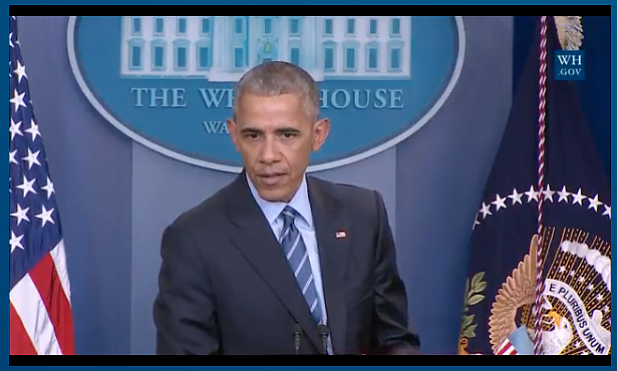WASHINGTON (AP) — The FBI is supporting the CIA's conclusion that Russia interfered in the presidential election with the goal of supporting Republican candidate Donald Trump.
In a message sent to employees, CIA Director John Brennan said he had spoken with FBI Director James Comey and James Clapper, the director of national intelligence.
Brennan said in the message that "there is strong consensus among us on the scope, nature, and intent of Russian interference in our presidential election."
A U.S. official who had seen the unclassified message from Brennan confirmed it to The Associated Press on Friday.
President Barack Obama is promising that the U.S. will retaliate against Russia for its suspected meddling in America's election process, an accusation the Kremlin has vehemently denied.
As the White House grew more bullish about suggesting President Vladimir Putin was personally involved, Obama said he'd spoken directly to Putin about his concerns about Russian meddling. He said whenever a foreign government tries to interfere in U.S. elections, the nation must take action "and we will at a time and place of our own choosing."
"We have been working hard to make sure that what we do is proportional, that what we do is meaningful," Obama said in an NPR News interview airing Friday.
Obama's remarks were the clearest indication that whatever response the U.S. is planning, it hasn't happened yet. The White House has insisted for months that when the U.S. did retaliate, it might not be made public, a position that has created uncertainty about the strength and timing of any response.
Obama was expected to face questions about the hacking and his response during a news conference at the White House on Friday afternoon.
White House officials said it was "fact" that Russian hacking helped Donald Trump's campaign against Democratic presidential nominee Hillary Clinton. White House press secretary Josh Earnest on Thursday also assailed Trump himself over his refusal to acknowledge the hacking and his attacks on the U.S. intelligence community.
The tough talk from the White House fell flat in Moscow, where Putin spokesman Dmitry Peskov called the accusations baseless and inappropriate.
"They should either stop talking about that, or produce some proof at last," Peskov told reporters Friday. "Otherwise it all begins to look unseemly."
There has been no specific, persuasive evidence shared publicly about the extent of Putin's role or knowledge of the hackings. That lack of proof undercuts Democrats' strategy to portray Putin's involvement as irrefutable evidence of a directed Russian government plot to undermine America's democratic system.
But the White House pointed to a U.S. intelligence assessment released publicly in October that asserted "only Russia's senior-most officials could have authorized these activities." And Obama's deputy national security adviser, Ben Rhodes, connected the dots further, saying Thursday Putin was responsible for the Russian government's actions.
"I don't think things happen in the Russian government of this consequence without Vladimir Putin knowing about it," he told MSNBC.
Trump has been under increasing pressure from both parties to acknowledge Russia's actions, despite his insistence that he doesn't believe Moscow was meddling. Trump has rejected the CIA's assessment that Russia's aim was to help him win and argued on Twitter that "these are the same people that said Saddam Hussein had weapons of mass destruction."
The head of the Senate Intelligence Committee, Republican Sen. Richard Burr, defended the U.S. intelligence community in a statement Friday pushing back on the notion that the CIA was trying to undermine Trump for political reasons. Burr said intelligence officials "come from all walks of life and hold views across the political spectrum."
"We would all do well to remember the sacrifices they make on our behalf and keep in mind that what we do with the intelligence they provide is up to us," Burr said.
Yet Trump appeared undeterred, mockingly asking in a Twitter post "are we talking about the same cyberattack" in which embarrassing information about the Democratic National Committee was also revealed. His tweet invoked emails stolen from Hillary Clinton's campaign chairman and later released publicly in hacking that has been linked to Russia.
In the NPR interview, Obama sought to contrast the current incident with "a traditional understanding that everybody's trying to gather intelligence on everybody else."
"One of the things we're going to have to do over the next decade," he said, is find an international understanding on rules involving what has become "a new game." Obama said that U.S. officials should not let "the inter-family argument between Americans" obscure the need for people to "stand together" on this issue.
"My view is that this is not a partisan issue," the president said, exhorting people to "take it out of election season and move it into governing season."
The explosive accusation suggests Putin, the leader of perhaps America's greatest geopolitical foe, directly undermined U.S. democracy. U.S. officials have not contended, however, that Trump would have been defeated by Clinton on Nov. 8 if not for Russia's assistance. Nor has there has been any indication of tampering with the vote-counting.
Copyright Associated Press. All rights reserved. This material may not be published, broadcast, rewritten, or redistributed.



Comments
Use the comment form below to begin a discussion about this content.
comments powered by Disqus